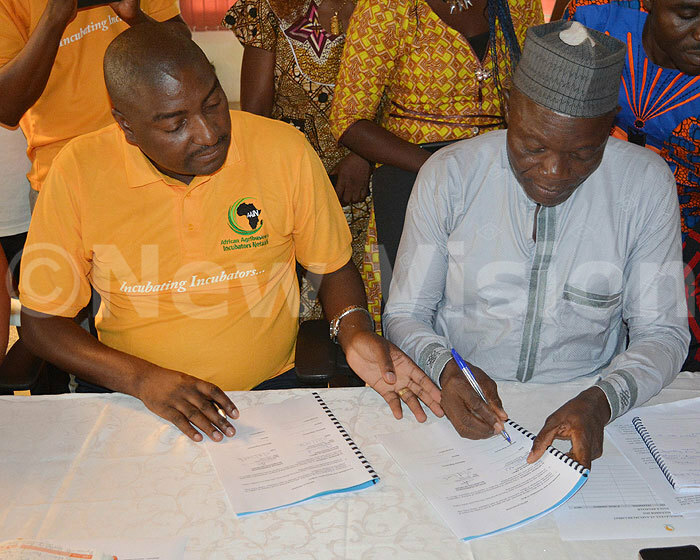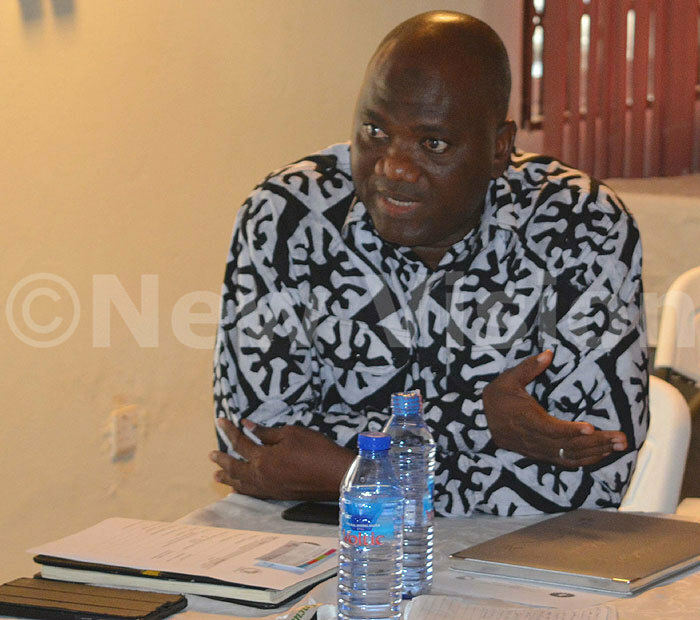4.5 million entrepreneurs in Ghana embrace agribusiness incubation
“We know that agribusiness incubation involves increased private sector participation with other key players."
PIC: AAIN Chief executive Dr Alex Ariho (left) and Saeed Moomen (right), the national president of the Association of Small-scale Industries (ASSI) in Ghana. (Credit: Solomon Kalema)
With modernisation changing the face of the economy today, Africa's artisan community and small-scale industries have not been left behind.
These smaller units of employment which absorb an estimated 80 percent of Africa's working population are the latest addition to agribusiness incubation through a Memorandum of Understanding (MoU) that was signed in Ghana.
This MoU between the African Agribusiness Incubators Network (AAIN) and the 4.5 million-member Association of Small Scale Industries in Ghana (ASSI) was signed Friday at the AAIN Secretariat after a roundtable discussion between the two leadership teams.
Dr Alex Ariho, the AAIN CEO, referred to the new partnership as a journey for Africa's smallest, yet most influential, entrepreneurs.
"We refer to them as small-scale but their impact is indeed enormous. The key technologies and innovations that they have only need a spotlight where investors can cite them. That is what the incubation model is about," he said at the signing event.
Saeed Moomen, the National President of the Association of Small Scale Industries (ASSI) in Ghana, hinted on the continent's common challenge of working in isolation which he said would be tackled in the partnership.
"We know that agribusiness incubation involves increased private sector participation with other key players and will also build business for micro- and small-scale industries," said Moomen.

Dr Alex Ariho and Saeed Moomen signed the agreement. (Credit: Solomon Kalema)
Ghana's private sector and commercial agriculture
Ghana's progress with private sector participation has a long history of a 'step by step' growth. In 1986, the small-scale industries association was opened to bring together 'small-scale entrepreneurs' to soldier on together.
But at the time, decentralisation had not included the bigger private sector.
At the peak of decentralisation in the 90's, an establishment in the name of Private Enterprise Federation (PEF) was set up as Ghana's Apex Business Council for the private sector in 1994 to help achieve this.
The federation, which was boosted by the African Development Bank (AfDB), set out to train and provide business development, incubation and advisory services to 2,000 Micro, Small and Medium Enterprises (MSMEs) across the ten (10) regions of Ghana.
In a statement that was presented before the Agriculture Ministry on the inaugural meeting with the Steering Committee in 2011, one element repeatedly appeared.
"We consider our membership of the Steering Committee as Government's formal recognition. But unless all the various activities in the Agriculture Value Chain are perceived as a Business, it will be difficult for Ghana to achieve significant GDP growth," it read.
The need to see agriculture as a business was high.
The partnership of ASSI and the African Agribusiness Incubators Network, according to Dr Ariho, is part meant to further the development of agribusiness in Ghana, especially for the SMEs.
"The most efficient way to create jobs is through upscaling SMEs who would otherwise remain at 90 percent risk of failure due to lack of access to finance and proper management practices.
That is the sustainability that ASSI and AAIN with other partners including PEF are rooting for," he said.
Incubation and private sector versus unemployment

At the signing event, Lukman Abdul Rahim (pictured above), the Executive Director of the National Board for Small Scale Industries (NBSSI), described the new partnership as a united effort against unemployment.
"What we are witnessing here today is a big step in uplifting the private sector as the main source of jobs that will be realised through incubation," he said.
The event highlights another addition to African partnerships signed this year in line with the African Union's Comprehensive Africa Agriculture Development Programme (CAADP).